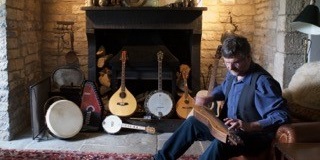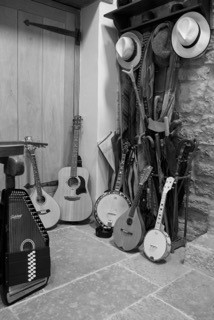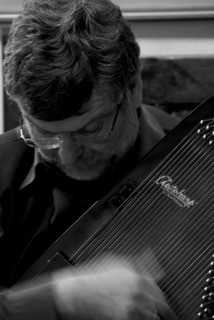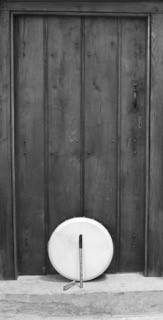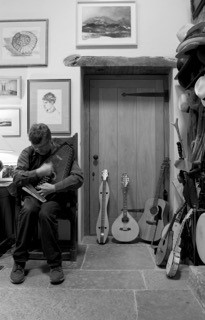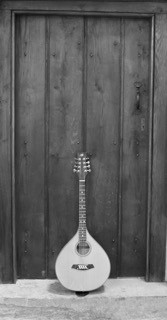My Music and Dupuytren's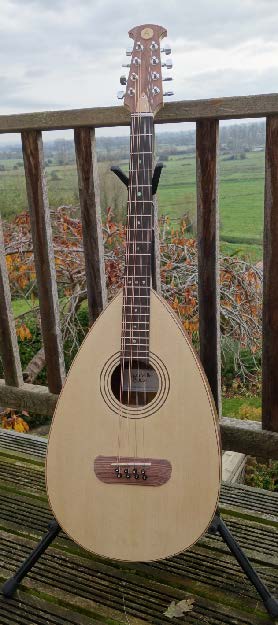
Since giving up playing classical guitar I've begun to re-learn instruments that have fewer strings and where you play melodies, rather than chords. I've also returned to the folk music I first played when I was a student at school and university, with traditional folk bands and as a solo singer. For a long time I used to "dabble" on instruments I'm now taking more seriously; tenor banjo, mandolin, harmonica, tin whistle and bodhrán (Irish drum). I've also started to learn more unusual folk instruments - Appalachian dulcimer, autoharp and banjo ukulele as well as an octave mandolin which I find easier to play than the normal mandolin because of its wider fretboard. My latest acquisition is another member of the mandolin family, the Mandocello (left) which I now use instead of an acoustic guitar in some song accompaniments.
It's now more than ten years since my first hand surgery, but the effects of Dupuytren's are still there (I get bad cramps in the fingers after playing for any length of time), and signs of it recurring in both hands are becoming more obvious. I needed a musical project that would help raise awareness and perhaps some money as well before I have to stop playing stringed instruments altogether - that project turned into "Scorn not the Strings".
Scorn not the Strings
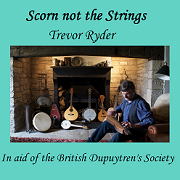 "Scorn not the Strings" is an album of traditional and not-so-traditional folk pieces connected only by the fact it's music I like. By the miracles of modern recording technology, I play all the instruments and sing all the vocals. Well, not quite; Robb Whiteman, my outstanding recording engineer / producer, has added one or two special effects and the odd bass track. Oh, and there's one "guest vocalist" (see Police Dog Blues, below). As many of my former pupils would say, apart from the bits that aren't my own work, it's all my own work. If you know your folk music, most of these titles will be familiar - although my arrangements are, I hope, new and different. The tracks are;
"Scorn not the Strings" is an album of traditional and not-so-traditional folk pieces connected only by the fact it's music I like. By the miracles of modern recording technology, I play all the instruments and sing all the vocals. Well, not quite; Robb Whiteman, my outstanding recording engineer / producer, has added one or two special effects and the odd bass track. Oh, and there's one "guest vocalist" (see Police Dog Blues, below). As many of my former pupils would say, apart from the bits that aren't my own work, it's all my own work. If you know your folk music, most of these titles will be familiar - although my arrangements are, I hope, new and different. The tracks are;
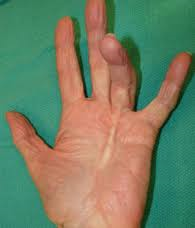 1. The Bard of Armagh; A 17th-century Irish song attributed to Bishop Patrick Donnelly, but long established in the "traditional" folk repertoire. The first line "Oh list to the lay of a poor Irish harper and scorn not the strings in his old withered hands" is where the album title comes from. "Strings" (or cords) are one of the early signs of Dupuytren's and it's not wise to ignore them - as I did. Click on the image (left) to hear this track.
1. The Bard of Armagh; A 17th-century Irish song attributed to Bishop Patrick Donnelly, but long established in the "traditional" folk repertoire. The first line "Oh list to the lay of a poor Irish harper and scorn not the strings in his old withered hands" is where the album title comes from. "Strings" (or cords) are one of the early signs of Dupuytren's and it's not wise to ignore them - as I did. Click on the image (left) to hear this track.
2. Three Irish Jigs (The Three Drummers / Shandon Bells / The Blarney Pilgrim); Three of my favourite Irish dance tunes which also happen to go well together. Well, I think so anyway.
3. The Lakes of Pontchartrain; Lovely Irish-American song that was popular with singers and bands in the 1970's when I first heard it. It's underlying message of inter-racial tolerance and respect is still relevant today and it's probably my favourite traditional folk song.
4. New York Girls / The Princess Royal (Bold Nelson's Praise); Bawdy song about a sailor on shore leave being taken for a ride (in a way he was not expecting) by a local "working girl". Followed by a suitably "naughtical" English hornpipe. Not to be taken too seriously.
5. A Somerset Wassail; Traditional seasonal song from Somerset with a tune that I think sounds much older than the words. I've tried to give it an "early music" feel in respect to the melody.
6. The Tailor's Britches; There are variations of this song about a tailor being fooled by the girl who is the focus of his unwelcome attentions from all over the British Isles. The idea of making tailors look foolish and conning them out of their money seems to have been popular in folkore; can't imagine why. This version is from the Bridport area of Dorset.
7. Plucking Poultry (The Hens March through the Midden / Turkey in the Straw); Scottish-American marriage of two tunes unrelated except by title and the fact they are both more usually played on the fiddle. I think chicken impressions are better done on the harmonics of a banjo but most fiddle players would probably disagree. Click on the turkey (right) and see what you think.
8. Police Dog Blues (Blind Blake, 1896 - 1934); I love the Blues and so does our dog, Scrumpy, an otherwise lovable labradoodle who always insists on singing along when I play the blues harmonica. He's the guest vocalist on this track and, unlike me, he did his recording in one take. Show off.
 9. Whale Song (the Mountains of Trash); I wrote the words to this song after hearing a story about a former sixth form pupil , Gwen Penry, who works in whale conservation in South Africa. That's her sitting on the Orca (left). You can follow the story yourself by clicking on the photograph. Read this article and it might make you sad, angry and maybe even both. I'm no composer, so I stole the tune from that lovely Irish ballad, The Mountains of Mourne. Replace "the mountains of Mourne sweeping down to the sea" with "the mountains of trash that you've dumped in the sea" and you get the gist of the song.
9. Whale Song (the Mountains of Trash); I wrote the words to this song after hearing a story about a former sixth form pupil , Gwen Penry, who works in whale conservation in South Africa. That's her sitting on the Orca (left). You can follow the story yourself by clicking on the photograph. Read this article and it might make you sad, angry and maybe even both. I'm no composer, so I stole the tune from that lovely Irish ballad, The Mountains of Mourne. Replace "the mountains of Mourne sweeping down to the sea" with "the mountains of trash that you've dumped in the sea" and you get the gist of the song.
10. Ten Thousand Miles Away; There are versions of this song about the tansportation of "criminals" to Australia from all over the British Isles. I've adapted an Irish version, which I like because I think the words fit the melody better than most of the other variants.
11. Leave Her, Johnny, Leave Her; I wrote the four-part harmony for this traditional capstan shanty for the Brue Boys, a choir I've performed with which is based near home in Somerset. I've used exactly the same harmony on this track, but with me singing all four parts. To be honest, it sounds better with 40 blokes singing it, but never mind.
12. Danny's Funeral (The Green Fields of America / Tie the Bonnet / The Mason's Apron); Danny was a fiddle player and piper I knew when I was a student and he was already quite old. He had probably forgotten more about playing Irish folk tunes than I will ever know. When he died, a group of friends who had shared many happy hours playing sessions with Danny were asked to play at his wake under strict instructions "to play only one bloody miserable tune and make the rest fit for dancing". This is what we played.

13. Bard of Armagh (Reprise); A short reminder of what this album is all about, with just guitar and vocal.
Recording and producing this album has only been possible thanks to the fantastic generosity of friends, family, ex-pupils and former colleagues who are acknowledged on the first page of this website. To order a CD and contribute further to fundraising go to enquiries@dupfolk.co.uk (or just click on the link below)

